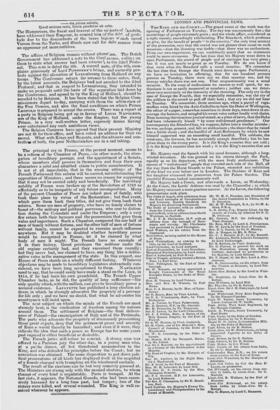The principal cry in France, at the present moment, seems
to be a reform of the Chamber of Peers,—in other words, the abro- gation of hereditary peerage, and the appointment of a Senate, whose members shall possess in themselves and from their own characters a solid and admitted claim to public consideration. It is not at all improbable, that in the ensuing sittings of the French Parliament this reform will be carried, notwithstanding the opposition of Ministers ; and there seems no reason for supposing that it may not be carried safely and beneficially. The hereditary nobility of France were broken up at the Revolution of 1789 so effectually as to be incapable of any future recomposit ion. Many of the present Chamber of Peers are indeed men of family, who took their place by virtue of the Restoration ; but that event, which gave them back their titles, did not give them back their estates. Some are men of property, who have no family claims to boast of—the military and political parvenus, who rose to distinc- tion during the Consulate and under the Emperor; only a very few retain both their honours and the possessions that gave them value and importance. Such a Chamber, composed the one half of men of family without fortune, and the other half of men of fortune without family, cannot be expected to exercise much influence anywhere. But it may be doubted whether hereditary power would be recognized in France, let it be claimed by what body of men it might. The French have no example of it in their history. Great privileges the noblesse under the old regime certainly had, and they exercised them roundly; but they never had, nor claimed to have, any thing like a delibe- rative voice in the management of the state. In this respect, our House of Peers stands on a wholly different footing. Whatever objections may be made to hereditary legislators abstractedly con- sidered, we have been long accustomed to them. NAPOLEON used to say, that he could easily have made a stand on the Loire, in 1814, if he had been his own grandchild. The French Upper Chamber lacks, as he did, the quality of long sufferance—the only quality which, with the million, can give to hereditary power a secured existence. LAFAYETTE has published a long election ad.- dress, in which he strongly advocates the propriety of a peerage for life only ; and we have no doubt, that what he advocates his countrymen will insist upon. The next subject on which the minds of the French are most strongly bent, is the vindication of freedom among the nations around them. The settlement of Belgium—the final deliver- ance of Poland—the emancipation of Italy and of the Peninsula. The party who advocate the propriety of strenuously prosecuting those great objects, deny that the permanent peace and security of Eurode would thereby be hazarded ; and even if it were, they ridicule the idea that such a peace as Europe has for some years past enjoyed is either beneficial or desirable.
The French juries still refuse to convict. A strong case was offered to a Parisian jury the other day, in a young man who, at a public dinner, all but threatened assassination to the King, and who defended his principles before the Court ; but no conviction was obtained. The same disposition to put down poli- tical prosecutions of all kinds has displayed itself in the acquittal of a female charged with trampling on the tricoloured cockade. The result of the elections can be but very remotely guessed at. The Ministers are strong only with the monied electors, to whom change of every kind is unpalatable. Paris is tranquil. At the last riots, it appears, the National Guards, who had been exces- sively harassed for a long time past, lost temper; two of the rioters were killed, and several wounded. The King is well re- ceived wherever he appears.


























 Previous page
Previous page